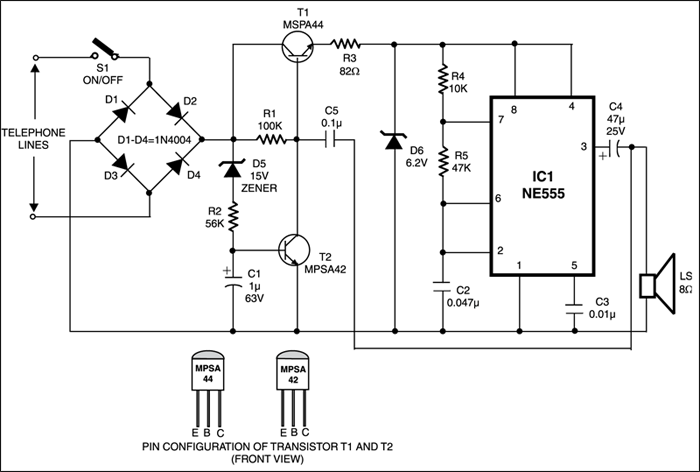Most of the telephone security devices available in market are simple but quite expensive. These devices provide blinking or beeping type line-tap misuse indications. Quite often they do not offer guaranteed protection against unauthorised operation. A very simple and unique circuit of a telephone watch-dog to safeguard subscriber telephone lines against any fraud is described here.
This little circuit keeps continuous watch over the telephone lines and sounds an alarm in case of any misuse. In addition it transmits a loud tone through the telephone lines to prevent further misuse.
When switch S1 is turned on, the normal (on-hook) telephone line voltage at the output of bridge-rectifier diodes D1 to D4 is approximately 48 volts, which being well above the break-down voltage of zener diode D5, the diode conducts. As a result transistor T2 gets forward biased. This effectively grounds the base of transistor T1 which is thus cut off and the remaining circuit does not get any power supply. In this state, only a small (negligible) current is taken by the circuit, which will not affect the telephone line condition. However, when handset of any telephone connected to the telephone lines is lifted (off-hook), line voltage suddenly drops to about 10 volts. As a result, transistor T2 is switched off and transistor T1 gets forward biased via resistor R1. Now, the astable multivibrator built around timer IC1 starts oscillating and the speaker starts sounding. Output of the astable multivibrator is also connected to the base of transistor T1 through capacitor C5. As a result, only a loud (and irritating) tone is heard in the ear-piece of the unauthorised telephone instrument.
This circuit can be constructed on a veroboard using easily available low-cost components and it can be connected to any telephone line without the fear of malfunctioning. No extra power supply is required as it draws power from the telephone line for operation.
EFY Note: Please disconnect the gadget when you are yourself using the telephone as it cannot distinguish between authorised and unauthorised operation.






